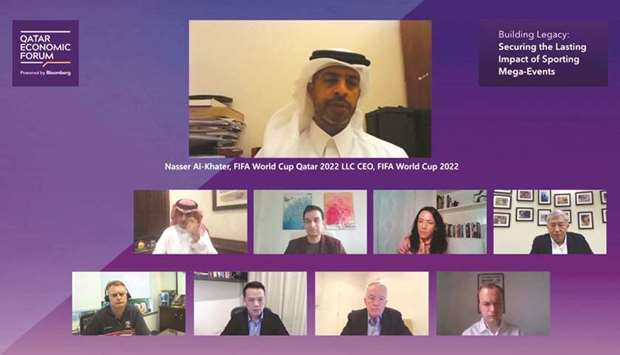From technological innovation to leaving a lasting legacy, FIFA World Cup Qatar 2022 will represent a lot more than just a spectacle for football.
FIFA World Cup Qatar 2022 LLC CEO Nasser al-Khater gave a brief insight into some of the ideas at play as part of the local organisation committee’s plans ahead of the mega event, besides elaborating on the legacy aspect of the event and the impact of Covid-19 on preparations when speaking at a roundtable discussion as part of the Qatar Economic Forum, Powered by Bloomberg, yesterday.
Al-Khater said, “Obviously the pandemic took us all by surprise, and it has probably become the binding element of the century, since we all have had to adapt to it personally and professionally. We have also seen its impact on large sporting events, most prominently the Tokyo Olympics.
“In anticipation of the possibility of this pandemic going forward and lasting, even as we hope that the scientific and the medical community can help us get over with as quickly as possible, we have implemented a lot of measures.”
Citing Qatar’s successful hosting of the AFC Champions League qualifiers and main draw, and the FIFA Club World Cup, al-Khater elaborated on how the hosts implemented strict protocols and compliance measures, and in fact consolidating all of their experiences into a playbook for other hosts across sporting disciplines to refer to.
“We tested all the members of the LOC, all the players regularly, we implemented the bio-bubble concept and even the fans, the 30 percent fans who turned up at the stadiums, were tested prior to the match. We tracked all of it since then and we have had no cases as a result of these tournaments,” al-Khater said at the roundtable titled ‘Legacy of Sporting Mega-Events’.
“The FIFA Club World Cup was the first big FIFA event to take place, which was actually supposed to take place in December, and then took place in February 2021, and the same measures were implemented. FIFA took our playbook, compared it to theirs and took a lot of lessons from there.”
Al-Khater revealed how Qatar looked into the hosts of previous mega events were always conscious about having to deal with white elephants after the World Cup.
“Without getting into details of the countries we looked at, a lot of them struggled with the use of the stadiums after the event. Many of them new, many refurbished, they had no legacy plans,” al-Khater said.
“What we decided was that in the design of the stadiums, we looked at their use beyond the World Cup. Right now we have a stadium, Ras Abu Aboud Stadium which will be completely dismantled after the World Cup, because this is a stadium that we don’t really need. It is a steel structure stadium that uses containers. Most of our other stadiums will be reduced in capacity. If they are 40,000, which is the minimum requirement for FIFA, they will go down to 20,000, and some stadiums will be completely converted to use of a non-sporting nature after the World Cup,” al-Khater added.
Russia’s implementation of Fan ID at the last World Cup, where a Qatari delegation had shadowed the 2018 hosts trying to learn and research as much as possible in preparation for the November 21-December 18, 2022, event had drawn positive responses.
“We are creating a one-stop shop hub as an application, and for many of you who may know the Fan ID that was implemented in Russia for security purposes, we are looking at transforming it into something much more, which can be used as an electronic wallet, security access for the stadiums, as an ID, electronic visa, and so on and so forth,” al-Khater said.
He also said that there have been ideas about using AI to understand fan behaviour, what teams they follow, etc, even as FIFA considers plans for an online marketplace for tickets.
With the state-of-the-art cooling technology central to the country’s bid to host the 2022 World Cup, al-Khater said, “The cooling technology had been implemented in Qatar since as early as 2008. We have moved into later generations of the technology, which is a lot more efficient.”
He added: “With the passing of time, we believe it will become cheaper, it is quite expensive now. We believe that entertainment events around the world will be able to use the cooling technology, which is also something that we will be happy to share with the world.”

FIFA World Cup Qatar 2022 LLC CEO Nasser al-Khater speaks at a roundtable called ‘Legacy of Sporting Mega-Events’ at Qatar Economic Forum, Powered by Bloomberg, on Tuesday.
